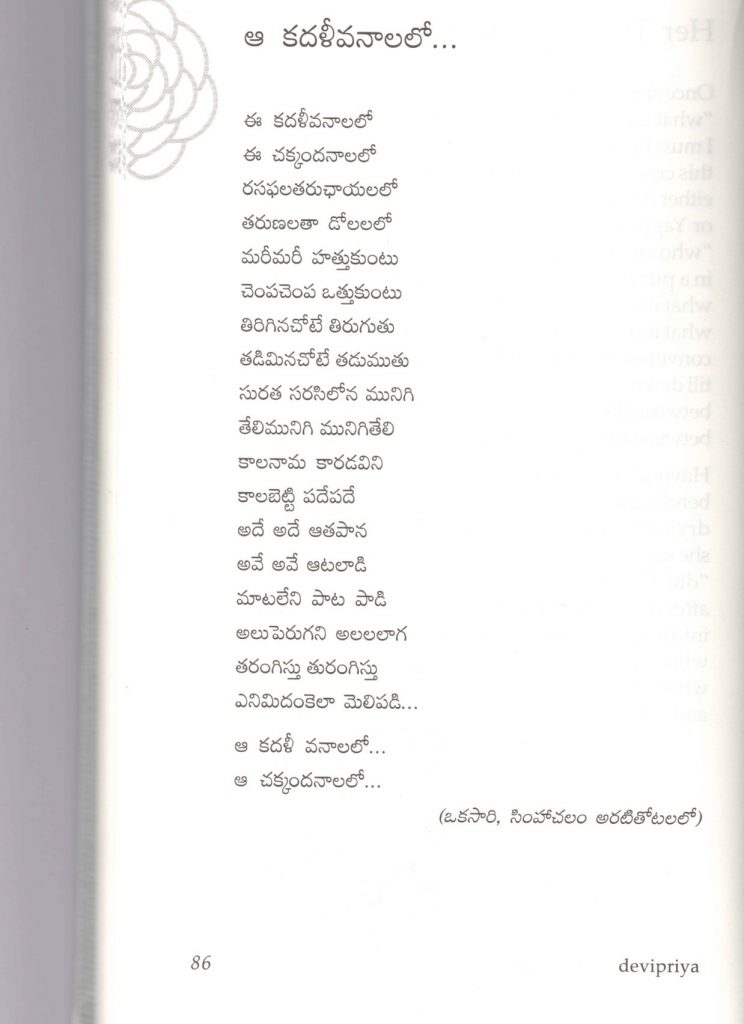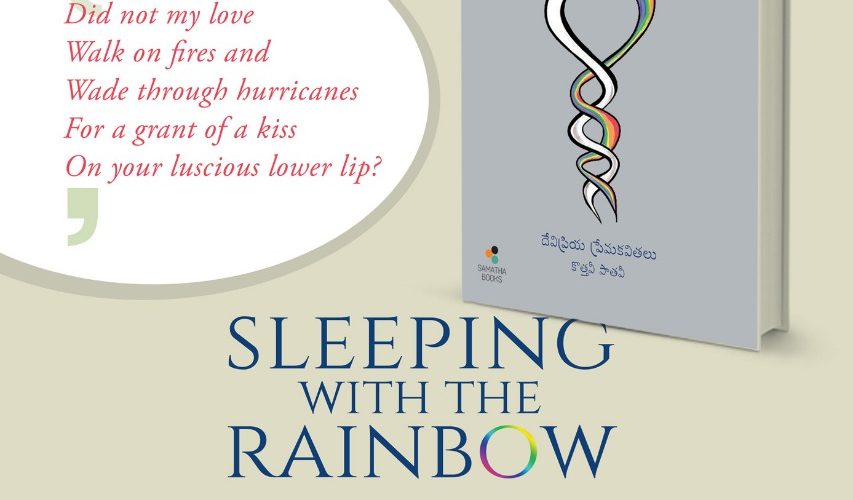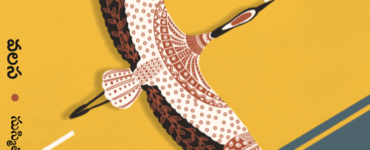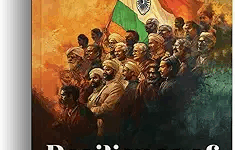An entire book of love poetry! That too from a left-wing poet! Maybe, someone who has read Telugu poetry from the left circles, may have expected to read a poem or two on the women companions in the movement or poems glorifying the mother. Should we then not expect a whole volume of love poems from such a poet? As though to answer my question, the very first page of the volume has the following lines of Karl Marx:
Truly, I would write it down
as a refrain,
For the coming centuries to see
Love is Jenny, Jenny is Love’s name.
And the explanatory note that follows which says: “Marx wrote five volumes of poems for his beautiful and dedicated wife Jenny Von Westphalen.”
So here we have a book that is certainly different. It looks like a collection of love poems written over several decades from the long poetic career of Devipriya, and as suggested in the subtitle to the volume, i.e., it is a volume of “Devipriya’s Love Poems, New and Old.”
I began to look for the origins of such a long affair with love poetry. Perhaps it has something to do with his schooling in poetic expression. He studied Telugu literature and English literature as subjects in his graduation. He was taught by Karunasri, Jandhyala Papayya Sastry. In an expansive interview detailing mainly his journalistic career with Telakapalli Ravi Devipriya says that he would not sacrifice his aesthetics for politics, not would he sacrifice his politics for his aesthetics. Perhaps this is his assertion that one could carry on both his preoccupations without one interfering with the other! In the same interview he declares that he is primarily a poet, though he has worn several hats. If I look at the Telugu originals given side by side with the English rendering, I can see in them a poet trained in Telugu and Sanskrit poetics, despite writing to choose free verse for his poetic expression.
I must therefore congratulate the translators, Vijay Koganti and Padmaja Kalapala, fellow translators, for undertaking the challenging task of translating his poems into English. They are aware of the complexity of rendering a poet whose expression seems simple on the surface, but how the word combinations, the mixing of Sanskritic diction and the employment of great imaginative flights stump the translators. They also express a sense of fulfillment at succeeding in this task despite all the constraints they had experienced.
The cover design and inner drawings by Varchaswee certainly add another dimension to the book. I would not venture into an analysis of the line drawings as the artist himself will speak about it. I would merely say that it is another act of translation of Devipriya’s work.
Majority of the poems make direct or indirect references to Rajyalakshmi, his beloved to whom Devipriya has dedicated this poem. In the poem, “The Speaking Hibiscus Flowers” the last two stanzas read as follows:
I love hibiscus flowers so much
and I feel like
catching the sun in my hand
every morn…
But as I am merciless
I pluck them
and offer every time to her lips
which are also like hibiscus flowers!
The romantic strain in the poem is all too apparent. But the feeling of mercilessness in his plucking the flowers is not, for it is an echo from Karunasri’s “Pushpavilapam”. Perhaps a note is in order here for the non-Telugu readers about Jandhyala Papayya Sastri’s most well-known poem about the sorrow expressed by the flowers on being plucked by women to adorn them in their hair.
There is another poem titled “How Did You Kindle Me…?” which reads well in English:
How did you recognize my glance,
which has nothing else but admiration
in the countless looks touching you
with desire, with thirst and with liking…?
How did you kindle me
with the wind of your eyelids…
Having known that secret
why do we need even this night
between us both
betwixt these two invisible fires,
these fuming dark drops of rain…!
The Telugu title of this poem is “Ela Rajesavu Nannu.” If I were to translate this poem, I would certainly read the pun on “Rajesavu” intended or otherwise, with “Raji”, the way the poet addresses his beloved. But how does one convey this pun in English?
How does one capture the style of “Aaa Kadaleevanaalalo”? Vijay and Padmaja attempt what looks like an impossible task in the following lines:
In Those Banana Gardens
In these banana gardens
in these beautiful places
in the shades of juicy fruit trees
in the swings of tender creepers
hugging closer and closer
pressing us cheek to cheek
going around the same places
caressing the same places
drowned in the erotic lake
floating and sinking and sinking and floating
burning the dark forest of time again and again
Playing the same games
with the earnest love
like the waves that know no fatigue
in a song
waving and riding
sans a word entwined like the eighth digit
in those plantain gardens
in those beautiful places…
Let us now read the Telugu poem in full now:
Read the poem now in the Telugu original:

I am sure we can appreciate the challenge the translators talk about, and the near impossibility of capturing, not just the rhythm, but the highly Sankritised diction, the repetition of consonant and vowel sounds and so on?
Another poem I liked in translation is “Another Day”. Let me read it:
Another Day
It pains
because you are the pain
It rains
because you the rain
It shines
because you are the flood
It waves because you are the wave…
No matter where you flew
I tread till the end
Here, where you died…
When I put the lights on
After every sun-set
You glow like a tiny lightning..
And you breeze in with every dawn
To wake me up from my trance
Whispering good mornings and
Kissing on the forehead with snowy lips
And to jolt me to wake up
Into another day, another night and another life.
That a whole of love poems could be gleaned from Devipriya’s output perhaps justifies their being translated into English in a single volume. In that sense, it may be regarded as a significant contribution and Vijay and Padmaja must be congratulated once again for this. From Devipriya’s point of view this may be a garland flowers he is offering to his departed beloved, Rajyalakshmi.
I was looking out for poems that would bring in the familiar “left-oriented” themes in the book. I could only find “Gorinta” translated as “Red Henna” where the poet contrasts his love for his beloved with the rebellious adivasi women:
You make my lips
touch the patterns
which glow like the vermillion on your forehead
and shine,
you bewitch me with the fragrance of henna..
And the poem ends with:
Imagine what happens there
in the palms of those rebellious women
who never decorate themselves with the wild
jasmines
the whole forest turning into henna
shines everywhere with the dark red fragrance!
I would have expected some more poems of this kind, especially from a writer who is known in the Telugu circles as a journalist of high standing, from one who had used his poetic genius to write a “running commentary” on the politics of his times, from one who had been associated for long with the left movement, from one who had a role in the making of alternative films such as Maa Bhoomi, Rangula Kala and Daasi, from someone who has used his poetry to comment on the contemporary political climate, and from someone who has published Sri Sri’s autobiography etc. Talking of Devipriya’s poetry, K. N. Y. Patanjali says: “Apart from Sri Sri there is none with greater diversity and expansiveness [than Devipriya] in Telugu.” That is kind of image Devipriya has established for himself in Telugu literary circles.
Therefore, a whole book of love poems from someone who is remembered largely as a writer who has articulated the voice of the people certainly raises questions about his representation in English. There is not a whole book of Devipriya’s poems in English on the left-oriented themes, a major preoccupation in his poetry. In the absence of a single book on these themes, to bring out a whole volume of love poems will certainly represent Devipriya very differently among the non-Telugu readers. If a volume of his love poems alone goes into English, what kind image would he present to the outsiders? I would therefore hope this is only the beginning of his being translated into English in the form of an entire volume, and that other volumes focussing on his major preoccupations would follow.
*
Devipriya. Sleeping with the Rainbow. Hyderabad: Samatha Books, 2019.
For copies:
- Samatha Books, ‘ Ammachettu ‘
204 – Rachakonda Towers
Alwal
Secunderabad- 500 010
Telangana State
India.
Mobile Phone : 9866 111 874.
2. Chaaya Resource Center.
3. Also available on Amazon and kinige









Add comment